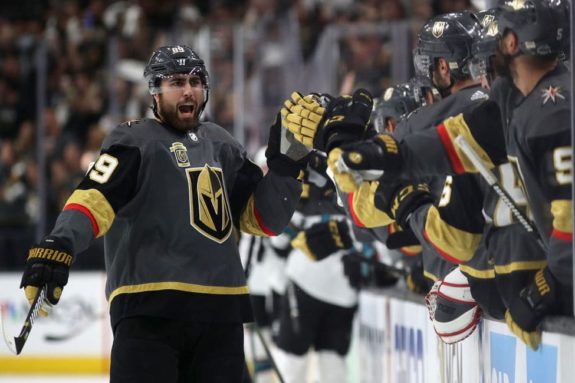There’s no local bias involved in the Vegas Golden Knights being among the most probable Stanley Cup contenders in the early odds for the upcoming 2020-21 season. At +900, they rank just behind the Colorado Avalanche (+450) and defending champion Tampa Bay Lightning (+800) as the third-largest favorite heading into next season.
And it’s easy to see why. After earning the Western Conference’s top seed in the qualification round robin and winning two rounds before being upended by the Dallas Stars in the Conference Final, the Golden Knights extended stalwart goalie Robin Lehner and added cornerstone defenseman Alex Pietrangelo. A full season of Lehner and a true No. 1 blueliner represent substantial improvement for a club that was already in Cup contention.
But, of course, it’s never that easy, in spite of what Vegas has already shown in three years of existence. A roster that looks good on paper still has to play the actual games — whenever those may be. In pursuit of what commissioner Gary Bettman is fond of calling the hardest trophy to win in all of sports, a team needs their fair share of good fortune, timely contributions and peak performance from more than just their top stars.
That latter point is particularly significant for Golden Knights fans. For all the talk of the depth and “roll four lines” approach of Vegas, many of their secondary players simply didn’t give them what they needed en route to a five-game series loss to Dallas. On the bright side, there is plenty reason for optimism of a bounce back from some Golden Knights who had less productive 2019-20 seasons. Here are four of the chief candidates to round back into form:
Cody Glass
If it feels like the Golden Knights have been waiting forever for blue chip prospect Cody Glass to develop into an elite everyday NHL player, it’s because they kind of have been. After all, Glass was the club’s first-ever draft pick, going sixth overall in 2017. Still, that’s hardly the fault of the Portland Winterhawks star, who is only 21 years of age and appears on track to earn a significant, top-six role with the big club this season.

Of course, this is hardly the first time big things have been predicted from Glass. After winning a job in training camp last season and recording four points in his first five games, the young center struggled to adapt with being moved up and down the lineup and then saw his campaign derailed by injuries that limited him to just 39 games. If Glass can get past some persistent knee issues that have slowed him down, he could offer more than just a tantalizing taste of his potential next season.
William Karlsson
No, William Karlsson will probably never duplicate the production of his magical 2017-18 campaign in which he potted 43 goals and recorded a plus/minus of plus-49, the highest single-season mark of any active NHL player. But even if his follow-up effort — 24 goals and 56 points as a formidable, two-way player in 2018-19 — serves as a better indicator of his expected production, that would bring substantial value.

In 2019-20, however, Karlsson wasn’t able to bring that. Despite spending much of the season centering the Golden Knights’ top line alongside Mark Stone and Max Pacioretty, Karlsson still only produced 15 goals while losing games to injury for the first time in his career. Whether paired with Stone and Pacioretty or, perhaps, Jonathan Marchessault and Reilly Smith, Karlsson will be given every opportunity to rebound in his age-28 season.
Alex Tuch
The league’s hiatus from March through July was something of a blessing for Vegas forward Alex Tuch. The 24-year-old suffered a lower-body injury about a month prior to the shutdown, an injury that might have jeopardized his postseason availability under normal circumstances. But by the time play resumed, Tuch was once again ready to go, scoring eight goals in 20 bubble games — roughly a 32-goal pace across an entire season.

(Photo by Christian Petersen/Getty Images)
The 20 bubble games might have represented a small sample size, but the results were nonetheless encouraging given what the Golden Knights have invested in Tuch. In 2018, he signed a seven-year, $33.25 million contract extension that will keep him locked up through 2026. The deal represented Golden Knights management betting on the former Minnesota Wild draftee’s future potential, gambling that the annual $4.75 million cap hit looks like a bargain at contract’s end. Maintaining his bubble pace would go a long way towards making that happen.
Brayden McNabb
One might expect that the addition of a minutes-eating defensive anchor would naturally push the rest of the blue line corps down the depth chart, at least somewhat minimizing their roles. However, the arrival of Pietrangelo could be a boon for Brayden McNabb, depending on how head coach Pete DeBoer opts to line up the defensive pairings. While the possibility of a starry Pietrangelo-Shea Theodore pairing looms, the club could be better off mixing things up by putting Theodore with Alec Martinez and leaving Pietrangelo with McNabb.

Under that scenario, Pietrangelo would be free to play on his natural right side and would also be afforded the opportunity to freelance into the offensive zone, thanks to McNabb’s feisty defensive presence. The 29-year-old has been one of the Golden Knights’ most underrated contributors over the past three seasons, averaging about 20 minutes a night while mostly being matched up against some of the opposition’s top players. (from ‘Defenseman Brayden McNabb quietly thriving for Golden Knights,’ Las Vegas Review-Journal,’ 01/01/2020) If paired with Pietrangelo, that secret will quickly be out and McNabb may well be recognized as an elite shutdown defender.
In all fairness, it’s almost impossible for all of Glass, Karlsson, Tuch and McNabb to enjoy significant gains from their 2019-20 seasons. Then again, Vegas may not need to go four-for-four. As long as most of the roster performs to expectation, even modest improvements elsewhere could make a difference and contribute to the seven-win discrepancy between last year’s Knights and their hopeful place as Stanley Cup champions.